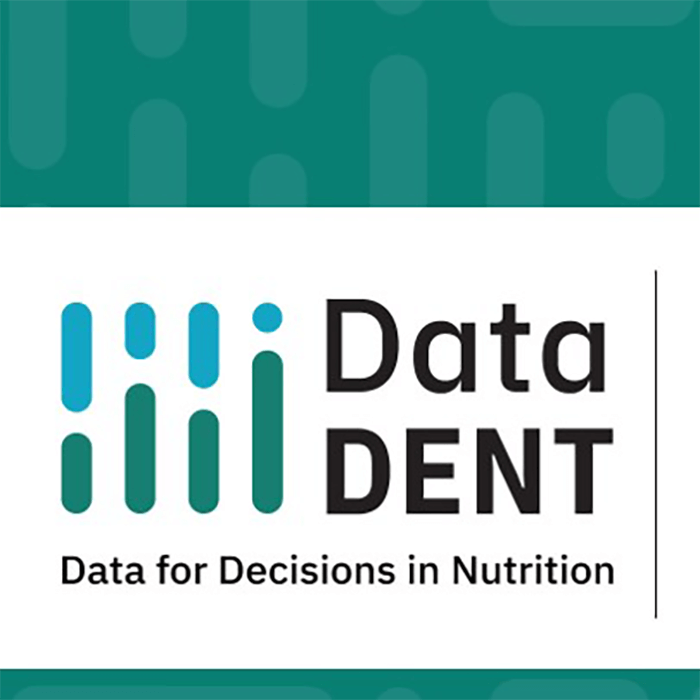The Challenge
High-quality and relevant nutrition data is needed to understand progress towards reducing malnutrition and reaching nutrition targets. However, nutrition data systems are fragmented and incomplete in low- and middle-income countries. This makes it difficult for governments, development partners, and other nutrition stakeholders to access and use data to monitor ongoing efforts and allocate resources.
Challenges exist at each link in the nutrition data value chain, including:
- Prioritization: define priorities and standard indicators;
- Creation & collection: generate high quality national and subnational data;
- Curation: aggregate, structure, and report field data;
- Analysis: Synthesize data, build analytical tools & models to derive insight;
- Translation & dissemination: Translate into program & policy recommendations;
- Decision-making: Make evidence-based decisions and implement policy.
These challenges currently fail to capture the complex, multisectoral causes of and responses to malnutrition.
The Opportunity
The Institute for International Programs (IIP) at Johns Hopkins Bloomberg School of Public Health, The International Food Policy Research Institute (IFPRI), and Results for Development worked together as part of the Data for Decisions in Nutrition (DataDENT) initiative from 2017 to 2021 to support all elements of the nutrition data value chain. This first phase of the DataDENT initiative aimed to transform the availability and use of nutrition data by addressing gaps in nutrition measurement and advocating for strong nutrition data systems.
DataDENT activities targeted each link in the nutrition data value chain through three interrelated work streams. Complementing global- and country-level initiatives, these activities address existing data gaps and how data can be presented to encourage data use and uptake by decision-makers.
Now, DataDENT 2.0, a three-year initiative (2022-2025) builds on the accomplishments and lessons of DataDENT 1.0. This initiative continues to work toward the ultimate goal of strong nutrition data value chains within and across LMICs and seeks to maximize the potential of data to support effective multisector nutrition policies and programs. DataDENT 2.0 seeks to achieve three primary outcomes:
- Improved strategic planning and coordination to support the collection and use of multisectoral nutrition data in Ethiopia and Nigeria
- Increased readiness to collect and use indicators of multisectoral nutrition intervention coverage in Ethiopia and Nigeria
- Increased multistakeholder knowledge exchange, collaborative action, and access to capacity development for strengthening multisectoral nutrition data value chains across LMICs.
Our Work
R4D’s work on DataDENT primarily focuses on supporting decision-makers’ nutrition data needs by assessing the costing and financing elements of nutrition data information systems (NIS).
Under DataDENT 1.0, R4D…
At the global level
- Conducted a landscaping of data visualization tools in nutrition and consultations with nutrition stakeholders globally and in priority countries to assess their data needs and challenges for decision making
- Published a desk review of national nutrition plans for 58 Scaling Up Nutrition (SUN) countries to identify whether they reflect data and NIS planning costs
- Completed the first ever analysis of donor financing for NIS using OECD’s Creditor Reporting System and development recommendations around data financing for donors that are relevant to all Nutrition for Growth (N4G) commitment areas
- Conducted a landscape analysis of trends and opportunities for nutrition data innovations with the aim of starting a conversation among donors, governments, and development partners in LMICs about emerging solutions to data challenges and potential investments in nutrition data innovations
In Nigeria
- Supported the Nigeria Governors Forum (NGF) to design and update a state-level nutrition scorecard that aims to hold Nigeria’s 36 Governors accountable to four nutrition commitments
- Developed a costing framework to help identify and weigh the monetary and non-monetary costs associated with adding or removing indicators across different survey and administrative data sources
In Ethiopia
- Collaborated with the Ethiopian Public Health Institute (EPHI) to conduct a landscape of financing for nutrition data in line with Strategy 12 of the Food and Nutrition Strategy
Under DataDENT 2.0, R4D will…
At the global level
- Develop a framework for costing and recommendations for financing nutrition data information systems across sectors, informed by country work in Nigeria and Ethiopia
In Nigeria
- Support the Nigeria Governors Forum to implement the scorecard indicator for nutrition budget and expenditure tracking across all states
- Contribute costing and financing components to the strategic plans or frameworks developed for national multisectoral nutrition data coordination
In Ethiopia
- Contribute costing and financing components to the strategic plans or frameworks developed for national multisectoral nutrition data coordination
For more information about DataDENT, please visit datadent.org.














